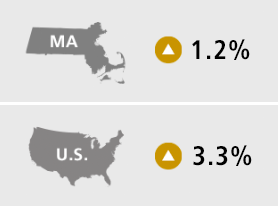Massachusetts economy slows notably in Q4, UMass Journal reports
High interest rates and slow employment growth limit expansion in the state
February 2024
» Download the detailed report
 In the fourth quarter of 2023, Massachusetts real gross state product (GDP) increased at an annual rate of 1.2 percent, according to MassBenchmarks, while U.S. GDP increased at a 3.3 percent annual rate, according to the U.S. Bureau of Economic Analysis (BEA). According to the BEA, in the third quarter of 2023, Massachusetts GDP grew at an annual rate of 4.8 percent while U.S. GDP grew at an annual rate of 4.9 percent. In the first and second quarters of 2023 the BEA estimates that Massachusetts GDP declined by 2.9 percent and grew by 2.9 percent respectively, while U.S. GDP grew at 2.2 percent and 2.1 percent respectively.
In the fourth quarter of 2023, Massachusetts real gross state product (GDP) increased at an annual rate of 1.2 percent, according to MassBenchmarks, while U.S. GDP increased at a 3.3 percent annual rate, according to the U.S. Bureau of Economic Analysis (BEA). According to the BEA, in the third quarter of 2023, Massachusetts GDP grew at an annual rate of 4.8 percent while U.S. GDP grew at an annual rate of 4.9 percent. In the first and second quarters of 2023 the BEA estimates that Massachusetts GDP declined by 2.9 percent and grew by 2.9 percent respectively, while U.S. GDP grew at 2.2 percent and 2.1 percent respectively.
 The performance of the Massachusetts economy was notably weaker than that of the U.S. in the final quarter of 2023. This weakness was broad based, and can be seen in employment, wage and salary income, and goods spending, all of which were weaker in the state than in the nation in Q4. This is due in part to the limits of state labor force capacity and Massachusetts being more sensitive to higher interest rates, particularly in technology and related services that rely on venture capital funding and business spending. Housing supply constraints — which are exacerbating affordability and cost of living challenges and likely fueling associated domestic out-migration — also likely limited growth in Q4 for reasons discussed below.
The performance of the Massachusetts economy was notably weaker than that of the U.S. in the final quarter of 2023. This weakness was broad based, and can be seen in employment, wage and salary income, and goods spending, all of which were weaker in the state than in the nation in Q4. This is due in part to the limits of state labor force capacity and Massachusetts being more sensitive to higher interest rates, particularly in technology and related services that rely on venture capital funding and business spending. Housing supply constraints — which are exacerbating affordability and cost of living challenges and likely fueling associated domestic out-migration — also likely limited growth in Q4 for reasons discussed below.
In the fourth quarter, payroll employment grew at an annual rate of 0.8 percent in Massachusetts as compared to 1.3 percent nationally. This followed annualized third quarter payroll employment growth of 1.7 percent in Massachusetts and 1.5 percent for the U.S. Relative to the fourth quarter of 2022, payroll employment in the fourth quarter of 2023 was up 1.9 percent in Massachusetts and 1.8 percent in the U.S. Weakening state employment growth is especially noteworthy in the business services sector, which usually grows faster than overall employment. State employment in this sector declined during the fourth quarter. During 2023, business services employment grew less than 0.5 percent. In 2022, employment in the business services sector grew over 4 percent.
Wage and salary income in Massachusetts in the fourth quarter, as measured by seasonally adjusted withholding taxes on personal income, declined at an annual rate of 9.6 percent from the third quarter, while nationally wage and salary income grew at a 4.6 percent annual rate. “The decline in Massachusetts was likely due to a much weaker than usual bonus season,” noted Alan Clayton-Matthews, Senior Contributing Editor and Professor Emeritus of Economics and Public Policy at Northeastern University, who compiles and analyzes the Current and Leading Indexes for MassBenchmarks. “Bonuses — largely from the financial sector — usually result in fourth quarter personal income withholding revenues 12.5 percent above trend relative to the third quarter, but in the fourth quarter of 2023, these withholding revenues only grew 9.2 percent,” Clayton-Matthews added.
In the fourth quarter, withholding revenues fell short of the Massachusetts Department of Revenue’s benchmark target by 2.2 percent. This suggests that after factoring out the effect of the smaller bonuses, Massachusetts experienced significantly weaker wage and salary income growth than for the U.S. in the fourth quarter, as much as 2 to 3 percent weaker.
There is growing evidence that the labor market is weakening in Massachusetts. The headline U-3 unemployment rate in Massachusetts rose to 3.2 percent in December from 2.6 percent in September, while in the U.S. it fell to 3.7 percent in December from 3.8 percent in September. Furthermore, the number of first-time unemployment insurance payments in Massachusetts appears to be rising and was 15 percent higher in the second half of 2023 than in the first, on a seasonally adjusted basis.
The broader U-6 measure of unemployment, which counts workers who work part-time but want full-time jobs (“involuntary part-time workers”), and persons who have recently given up looking for work but have looked for work in the past year (“marginally attached workers”), as unemployed, rose to 8.0 percent in Massachusetts in December from 5.4 percent in September. In the U.S. the U-6 rate was 7.1 percent in December and 7.0 percent in September. Both the Massachusetts and U.S. estimates are from the CPS and are seasonally adjusted (MA data are seasonally adjusted by MassBenchmarks). The rise in Massachusetts was not due to a rise in involuntary part-time work or in marginally attached workers, but from an increase in traditional unemployment.
Seasonally adjusted real spending on goods subject to the state regular sales tax and motor vehicle sales taxes was up 12.7 percent on an annualized basis in the fourth quarter, following a 19.4 percent annualized decline in the third quarter. This spending in the fourth quarter was down 3.5 percent from the fourth quarter of 2022, reflecting the weakness in consumer and business spending on taxable goods. This weakness may partly reflect the low level of home purchasing during 2023. Spending on home furnishing and home improvement materials often accompany purchases of new and existing homes. In contrast, national seasonally adjusted current dollar consumer spending on goods grew 1.9 percent on an annualized basis in the fourth quarter and 3.5 percent from the fourth quarter of 2022 to the fourth quarter of 2023. Nationally, consumer spending on durable goods grew 1.0 percent in the fourth quarter and 3.8 percent on a year over year basis (from the fourth quarter of 2022 to the fourth quarter of 2023).
Consumer prices generally have been rising more slowly in the Boston metropolitan area than in the U.S. (all metro areas). Although the “all items” Boston area inflation rate exceeded that of the U.S. in the fourth quarter, 3.5 percent for Boston versus 2.8 percent for the U.S., the year-over-year (Q4 22 -Q4 23) inflation rate was lower for the Boston area, 2.3 percent versus 3.2 percent for the U.S. Core price inflation continues to be lower in Greater Boston than nationally. In the fourth quarter, core prices rose 2.5 percent in the Boston area versus 3.4 percent for the U.S.; and 3.2 percent between the fourth quarter 2022 and the fourth quarter 2023, as compared to 4.0 percent nationally during the same period.
Higher interest rates appear to be taking their toll on the Massachusetts economy, arguably to a greater degree than nationally, at least for now. This can be seen in state tax revenue collections, which have been coming in below expectations for several months. In December, a forecast prepared by Professor Clayton-Matthews estimated that the direct impacts of higher real interest rates would lower fiscal year 2024 state tax revenues by approximately $500 million in the last 8 months of the 2024 fiscal year, and by $1.3 billion in fiscal year 2025.
The outlook of the Wall Street Journal survey of economists is for U.S. GDP growth to slow in the first half of this year to an annualized rate of 0.9 percent in the first quarter and 0.5 percent in the second quarter, followed by somewhat faster growth in the second half of this year, as the Fed is expected to begin to cut interest rates in the spring. It is likely that Massachusetts will continue to grow slowly in the first half of 2024.

